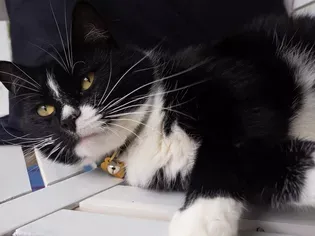Is Your Cat Depressed? Signs, Causes, and Treatment
Updated on 04/26/24

Is Your Cat Depressed? Signs, Causes, and Treatment
Our beloved feline companions bring us immense joy and companionship. However, just like humans, cats can also experience emotional distress and depression. Recognizing the signs of depression in cats is crucial for providing timely support and ensuring their well-being.
Signs of Cat Depression
* Changes in Behavior: Depressed cats may exhibit significant changes in their behavior, including:
* Lethargy and Loss of Interest: Withdrawal from activities they once enjoyed, decreased grooming, and reduced playfulness.
* Changes in Appetite: Loss of appetite or, conversely, increased appetite due to stress eating.
* Changes in Sleep Patterns: Excessive sleeping or insomnia.
* Aggression: Uncharacteristic aggression towards people or other pets.
* Hiding and Avoidance: Hiding in unusual places or avoiding social interactions.
* Physical Symptoms: Depression can also manifest physically in cats:
* Weight Loss or Gain: Changes in body weight due to changes in appetite or reduced activity.
* Poor Grooming: Neglecting grooming, leading to a disheveled appearance.
* Digestive Issues: Vomiting or diarrhea due to anxiety or stress.
* Skin Problems: Excessive licking or scratching, leading to skin irritation or infection.
Causes of Cat Depression
* Loss of a Loved One: Cats can experience grief and depression after losing a companion, whether it's another cat, a human, or even a favorite toy.
* Environmental Changes: Major changes in their environment, such as moving to a new home, adding a new pet to the family, or redecorating, can cause stress and depression.
* Medical Conditions: Physical ailments, such as chronic pain or thyroid disease, can lead to depression in cats.
* Boredom and Lack of Stimulation: Cats are curious and intelligent creatures that need mental and physical stimulation to stay happy. Extended periods of boredom or lack of activity can contribute to depression.
* Neglect or Abuse: Unfortunately, some cats may experience neglect or abuse, which can have severe psychological consequences, including depression.
Treatment for Cat Depression
* Veterinary Examination: The first step is to rule out any underlying medical conditions that may be contributing to your cat's depression. Your veterinarian will perform a thorough physical examination and may recommend diagnostic tests to identify any potential health issues.
* Environmental Enrichment: Providing your cat with a stimulating environment can help alleviate boredom and improve their mood. This includes:
* Interactive Toys: Engage your cat with toys that encourage physical and mental activity, such as laser pointers, puzzle feeders, or catnip mice.
* Scratching Posts: Provide multiple scratching posts to encourage natural scratching behavior, which can help release tension and stress.
* Cat Tree: A cat tree offers cats a vertical space to climb, perch, and observe their surroundings, which provides enrichment and security.
* Social Interaction: If possible, consider introducing a compatible companion cat to provide companionship and social stimulation. Supervised playdates with other friendly cats can also be beneficial.
* Medication: In some cases, your veterinarian may prescribe medication, such as antidepressants, to help regulate your cat's mood and relieve anxiety. This is typically combined with other treatments to address the underlying cause of depression.
* Behavioral Therapy: A veterinary behaviorist can provide professional guidance and techniques to help manage your cat's depression. This may involve training, desensitization, or other methods tailored to the specific needs of your feline friend.
Remember:
* Patience is Key: Treating cat depression takes time and consistency. Patience and support are crucial for your cat's recovery.
* Avoid Punishment: Never punish your cat for displaying symptoms of depression. This will only worsen their anxiety and fear.
* Seek Professional Help: If you suspect your cat may be depressed, don't hesitate to seek professional help from your veterinarian or a veterinary behaviorist. Early intervention can significantly improve your cat's quality of life.
By understanding the signs, causes, and treatment options for cat depression, you can provide your beloved companion with the support and care they need to overcome this emotional challenge. Remember, your cat deserves to live a happy and fulfilling life, and it's our responsibility to ensure their emotional well-being.
Explore More Pets

Cat Behavior Problems
How to Stop Aggression in Kittens

Long-Haired Cat Breeds
Siberian Cat: Breed Profile, Characteristics, & Care

Cat Behavior Problems
How to Stop Kittens From Scratching and Biting

Long-Haired Cat Breeds
Turkish Angora: Cat Breed Profile, Characteristics & Care

Basic Training
How to Socialize Your Kitten

Short-Haired Cat Breeds
Cute Pictures & Facts About Calico Cats & Kittens

Litter Box Training
Training Your Kitten to Use the Litter Box

Long-Haired Cat Breeds
10 Fun Facts About White Cats